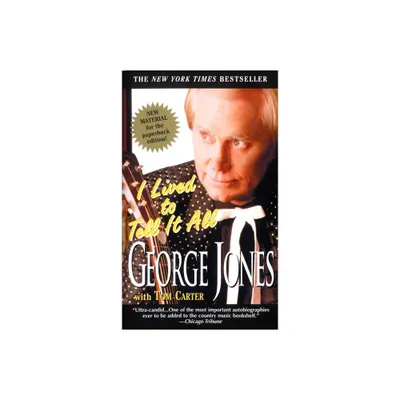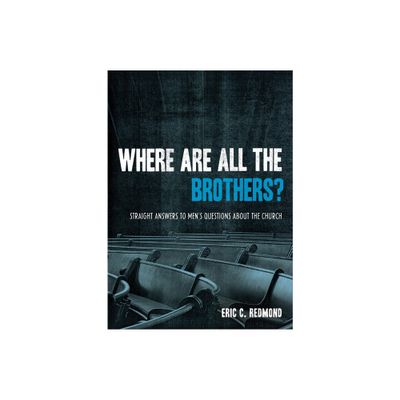Home
Tell It All Brother
Loading Inventory...
Barnes and Noble
Tell It All Brother
Current price: $14.99


Barnes and Noble
Tell It All Brother
Current price: $14.99
Loading Inventory...
Size: OS
*Product Information may vary - to confirm product availability, pricing, and additional information please contact Barnes and Noble
Appearing on their sixth album,
Tell It All Brother
, are the last two hits from
Kenny Rogers & the First Edition
, their sixth and seventh Top 40 chart-climbing 45-rpm records. Deep vocals with a bass-heavy rock sound employing just a touch of country leanings are what resonate through the title track.
Alex Harvey
's "Tell It All Brother," a political song that went Top 20 in the summer of 1970, is followed by
Kin Vassey
's "Heed the Call," one of the three weakest of
Rogers
' 27 Top 40 hits released between 1968 and 1984 (it lingered in the Top 35 in November of 1970). But "Heed the Call" is a great song, more uptempo than "Ruby," "Reuben James," and "Tell It All Brother," and with undeniable charm. "Heed the Call" begins with tambourine and has gospel-inflected vocals over handclaps, marching drumbeats, and a campfire feel. It is, along with being the band's final hit, one that displays individual talents working in unison perhaps better than any of their previous commercial efforts. It contrasts with the title song chant, which is all
, his big voice over the bass drum and tambourine, with piano and bass taking a back seat and the guitars invisible. "Shine on Ruby Mountain" is a
Kenny Young
song, and it has the uptempo square dance drive that is present on many of the non-hit album tracks.
' adaptation of the traditional "Camptown Ladies" continues the party atmosphere with a hootenanny vibe.
Mike Settle
gets only one composition here, a far cry from the nine songs
Settle
wrote on the first album and the four he composed on
First Edition '69
, perhaps indicating how settled in
and producer
Jimmy Bowen
were at this point in time. "I'm Gonna Sing You a Sad Song Susie" isn't a bad song -- it just sounds like the singer/songwriter was listening to
Glen Campbell
's 1969 hit "Where's the Playground Susie" a little too much.
' sole original, "Love Woman," co-written with
Douglas Legrand
, is an uptempo country-rocker, with the direction of the group more defined -- it is no longer just a band but a vehicle for an emerging major star. After "Heed the Call," things come down a bit on side two with
Harvey
's third composition on the album, the beautiful ballad "Molly." It should have been a hit, for it is
's "Delta Dawn" slowed down and ready to become a part of
Elton John
's
Tumbleweed Connection
album. "After All (I Live My Life)" is a perfect showcase for new addition to the group
Mary Arnold
, and why she didn't climb the charts with this group is a mystery -- she arguably has the best and most distinctive voice. The two hits on this album did not get on
' 1977
Ten Years of Gold
retrospective, and though they aren't his best-known songs, they show that this crew had no aversion to experimenting with the formula. Both tunes add an interesting dimension to the band's classic 1971 release,
Kenny Rogers & the First Edition's Greatest Hits
. ~ Joe Viglione
Tell It All Brother
, are the last two hits from
Kenny Rogers & the First Edition
, their sixth and seventh Top 40 chart-climbing 45-rpm records. Deep vocals with a bass-heavy rock sound employing just a touch of country leanings are what resonate through the title track.
Alex Harvey
's "Tell It All Brother," a political song that went Top 20 in the summer of 1970, is followed by
Kin Vassey
's "Heed the Call," one of the three weakest of
Rogers
' 27 Top 40 hits released between 1968 and 1984 (it lingered in the Top 35 in November of 1970). But "Heed the Call" is a great song, more uptempo than "Ruby," "Reuben James," and "Tell It All Brother," and with undeniable charm. "Heed the Call" begins with tambourine and has gospel-inflected vocals over handclaps, marching drumbeats, and a campfire feel. It is, along with being the band's final hit, one that displays individual talents working in unison perhaps better than any of their previous commercial efforts. It contrasts with the title song chant, which is all
, his big voice over the bass drum and tambourine, with piano and bass taking a back seat and the guitars invisible. "Shine on Ruby Mountain" is a
Kenny Young
song, and it has the uptempo square dance drive that is present on many of the non-hit album tracks.
' adaptation of the traditional "Camptown Ladies" continues the party atmosphere with a hootenanny vibe.
Mike Settle
gets only one composition here, a far cry from the nine songs
Settle
wrote on the first album and the four he composed on
First Edition '69
, perhaps indicating how settled in
and producer
Jimmy Bowen
were at this point in time. "I'm Gonna Sing You a Sad Song Susie" isn't a bad song -- it just sounds like the singer/songwriter was listening to
Glen Campbell
's 1969 hit "Where's the Playground Susie" a little too much.
' sole original, "Love Woman," co-written with
Douglas Legrand
, is an uptempo country-rocker, with the direction of the group more defined -- it is no longer just a band but a vehicle for an emerging major star. After "Heed the Call," things come down a bit on side two with
Harvey
's third composition on the album, the beautiful ballad "Molly." It should have been a hit, for it is
's "Delta Dawn" slowed down and ready to become a part of
Elton John
's
Tumbleweed Connection
album. "After All (I Live My Life)" is a perfect showcase for new addition to the group
Mary Arnold
, and why she didn't climb the charts with this group is a mystery -- she arguably has the best and most distinctive voice. The two hits on this album did not get on
' 1977
Ten Years of Gold
retrospective, and though they aren't his best-known songs, they show that this crew had no aversion to experimenting with the formula. Both tunes add an interesting dimension to the band's classic 1971 release,
Kenny Rogers & the First Edition's Greatest Hits
. ~ Joe Viglione


















